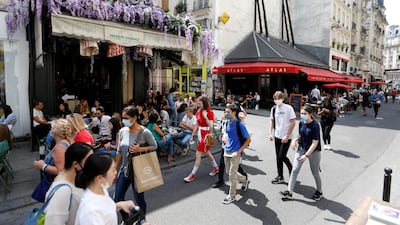The renaissance of cafe society in France has taken cautious first steps amid hopes for gradual economic recovery but also apprehension about the impact of the Covid-19 pandemic and the risk of a second wave.
In Paris, on theIf keeping the distance between tables is impractical, dividing screens are installed and throughout the country, people took advantage of warm weather and the relaxation of restrictions to dine out or enjoy drinks on terraces on Tuesday for the first time since the president, Emmanuel Macron, ordered a lockdown in mid-March.
Only outside seating is allowed in the Paris region and restaurateurs and bar owners must place tables sufficiently apart to ensure the one-metre rule is observed. If keeping the distance between tables is impractical, dividing screens are installed. Other countries, such as the US and UK, recommend two metres as the safe distance.
Outside the capital, with variations from town to town, proprietors are encouraged to make as much use as possible of outdoor space, with greater flexibility allowed on the use of pavements and new speed limits to minimise the danger from traffic passing closer to customers’ tables.
Even then, as could be seen at the Gecko, a cafe in the French Riviera resort of Le Lavandou, post-lockdown etiquette poses challenges to staff and public alike. Live music resumed at the bar on Tuesday night with distances maintained between tables, gel dispensers available and bar staff wearing masks.
“It was good to be taking these smalls steps back to normality,” said one musician, Jean-Louis Witas. “But it felt strange. It was clearly difficult to prevent people passing closer to each other than one metre. Live music depends on a convivial ambience. I was only playing guitar but what happens when I sing? A singer who is infected could transmit the virus orally to people in the audience. And then there are people passing close to the stage.”
_______________
Coronavirus around the world
_______________
In Paris, despite the absence of foreign tourists – expected to start returning from June 15 – many terraces were a third or half full on Tuesday evening, though more attention in the capital was focused on outbreaks of rioting during otherwise peaceful protests against racism.
Although the trigger for the demonstrations was the case of George Floyd, the black American who died after being arrested by police officers in Minneapolis, many protesters evoked the case of Adama Traore, a young French-Malian who died in police custody after being detained in the Parisian suburb of Beaumont-sur-Oise four years ago.
The French prime minister Edouard Philippe said this week that the rate of spread of the virus was currently “under control”, putting France on the road to normality by the end this month. But health experts warn that Covid-19 “remains active” and with 29,000 coronavirus deaths recorded, making France the fifth worst affected after the United Sates, the UK, Italy and Brazil, the risk of a second wave cannot be ignored.
Many restaurateurs have chosen not to reopen, citing fears about profitability or a resurgence of the virus. With sunshine giving way to rainfall, Parisian owners are also concerned about the effects of the weather on terrace-only trade.
But while it will take time for business to return to pre-crisis levels, and for foreigners to return to one of the world’s most popular tourist destinations, the appetite for resuming life as before is strong. The France 24 television network reported a queue of about 100 people in the western city of Nantes as the Prison de Bouffay restaurant reopened its doors at the stroke of midnight on Monday.
In other measures easing lockdown rules, rail services are being resumed, Paris’s second airport, Orly, hopes to be open again on June 26, museums and monument are accepting visitors subject to restrictions and the limit of 100 kilometres on travel from home has been lifted.
But as Mr Macron prepares to announce details of how France will handle post-crisis recovery, it is broadly accepted that life has changed during the pandemic, with even mundane chores becoming a source of anxiety.
“My loathing for supermarket shopping has become stronger,” said Louise Manfield, a British woman living in the south-western town of Carcassonne. “I only have to go inside to feel unable to suppress a cough which has people looking at me as if I have the plague. And maybe I have!”














